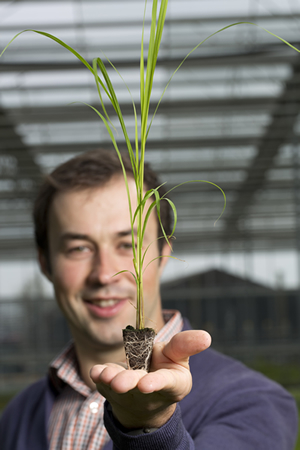

M i s c a n t h u s B r e e d i n g

MUST : Miscanthus upscaling technology
1 January 2016 - 31 December 2018
Aberystwyth University scientists are playing a pivotal role in a new £1.8m project to develop the technology required to plant the energy crop miscanthus from seed.
As part of a project led by Terravesta Assured Energy Crops and funded by Agri-Tech Catalyst, a team from the University’s BBSRC strategically-funded Institute of Biological, Environmental and Rural Sciences (IBERS) team will investigate how to optimise conditions for producing seed, and will trial a number of new varieties to investigate their yield and suitability for UK conditions.
Miscanthus is a plant with a straw-like stem that grows 2-3 metres high in a year, is harvested in spring and grows back from the roots to produce a crop each year. It can grow well on land less suitable for food crops, and the harvested crop is currently used for bioenergy for heat and power and in the future as a feedstock for the emerging bio-based economy. UK demand for biomass for electricity generation currently exceeds 5 million tonnes a year of which 75% is imported.
The current method for planting miscanthus is from sections of root called rhizomes dug up from other miscanthus plants, but this limits how much can be planted annually. Planting miscanthus using seed allows the crop areas to be upscaled 200 times faster, and there by making a significant contribution to the market demands reducing dependence on imports.
This project entitled Miscanthus UpScaling Technology (MUST) aims to understand how to upscale miscanthus seed production (of promising hybrids bred to date), and produce commercially relevant best practice growing and harvesting information so that more of the crop can be grown in the UK and create a new industry of benefit to farmers and the rural economy.
Leading the project for IBERS is Dr John Clifton Brown, who’s confident in the future of this crop. He describes the project, what impact it will have for the agricultural industry, and ultimately, the implications for reducing UK CO2 emissions.
“Seed based hybrids are now being developed here to speed up the planting process and during this research project IBERS scientists will develop methods to upscale seed

Michal Mos,
Head of Science & Technology at Terravesta with a miscanthus plug developed from seed, ready for planting.
Copyright: IBERS
production using four trial sites across the UK," says Dr Clifton Brown.
“Miscanthus originates from Asia, and with the help of DEFRA and the BBSRC (Biotechnology and Biological Sciences Research Council) we have spent the last 10 years developing it into a crop that can be grown by farmers in the UK and that can supply the growing UK biomass demand.
“Several harvesting approaches will be explored to maximise crop quality and quantity. The overall goal is to develop new systems for miscanthus based agriculture that increase profitability and so enable transition of today’s niche crop into a large scale biomass supply system,” he says.
“The UK needs to reduce CO2 emissions in order to mitigate climate change, and we also need to develop our economy to take advantage of green technologies as opposed to relying on a limited stock of fossil fuels,” he added.

M i s c a n t h u s B r e e d i n g t o p r o v i d e s u s t a i n a b l e g l o b a l b i o e n e r g y f o r t h e f u t u r e